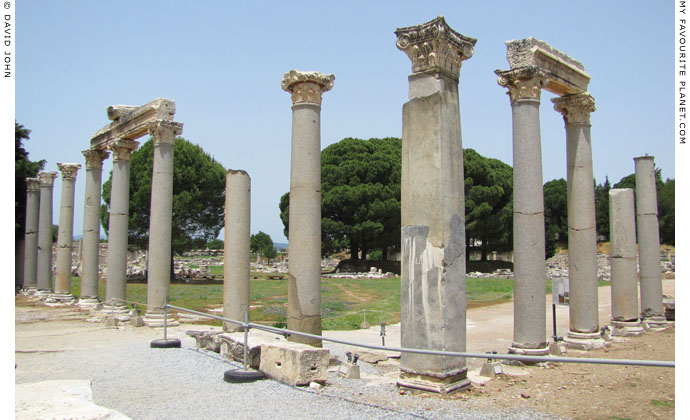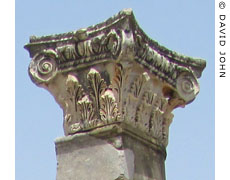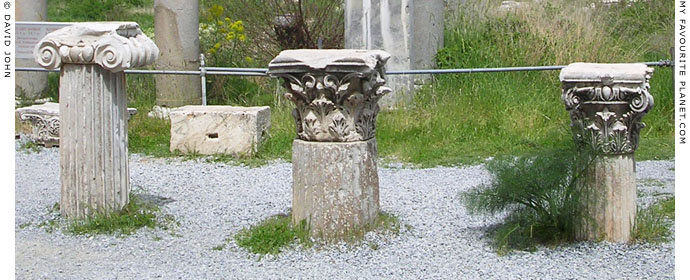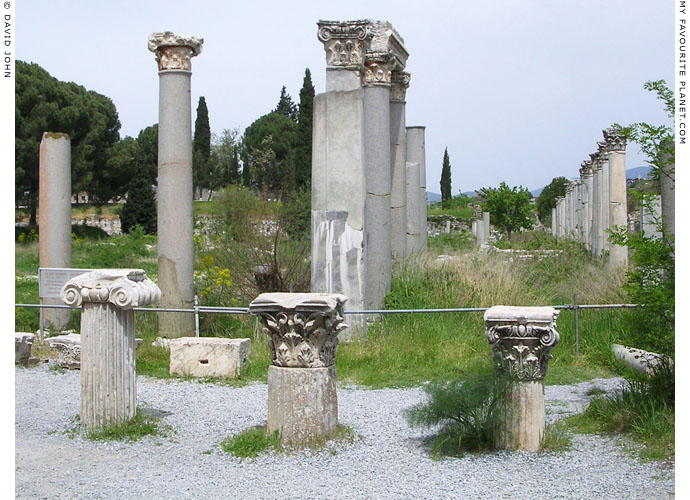|
|
|
| My Favourite Planet > English > Middle East > Turkey > Ephesus > photo gallery |
| Ephesus, Turkey |
Ephesus photo gallery 1 |
 |
 |
39 of 62 |
 |
 |
|
| |

The outer colonnade of the stoa around the southeast corner of the Lower (Commercial) Agora. |
| |
The Lower Commercial Agora
The Lower Commercial Agora, also known as the Tetragonos Agora (Greek, τετράγωνος ἀγορά, the square market), stands on the west side of the Marble Way, between Kuretes Street and the Great Theatre, and immediately north of the Library of Celsus and the Gate of Mazaus and Mithridates. The other main entrance to the agora was the West Gate, from which a street led west towards the harbour.
The agora was built during the Hellenistic period, and redesigned and rebuilt during the reigns of Emperors Claudius (41-54 AD) and Nero (54-68 AD), when the ground level was raised 2-3 metres. The marketplace, measuring 110 x 110 meteres, consists of a large open square surrounded by rows of hops within roofed stoas (colonnades), supported by columns and pillars with composite capitals.
The Museum for the Visually Impaired is in the southeast corner of the agora, on the right as you enter through the Gate of Mazaus and Mithridates.
To the southwest of the square, and entered by the street of the West Gate, was the Serapeion, the sanctuary and temple of the god Serapis. |
|

The composite capital on the
pillar on the southeast corner
of the Lower Agora stoa. |
|
| |

Column capitals exhibited at the southeast corner of the Lower Agora, outside
the Museum for the Visually Impaired, to demonstrate the different orders.
From left to right:
Ionic, Corinthian and composite (with the attributes of Ionic and Corinthian). |
| |
|
Marble reliefs in the Lower (Commercial) Agora, Ephesus.
|
The marble relief of a palm branch and an oil jar, on the left, is displayed to the right as you enter the Lower Agora through the Gate of Mazaus and Mithridates. It stands next to the entrance to the Museum for the Visually Impaired.
The Relief, often described as "a funerary stele of a soldier", depicting a helmet, greaves (shin armour) and a sword, formerly displayed next to it, now stands on the path between the Lower Agora and the Great Theatre. The helmet has a ceremonial horsehair plume and cheek-pieces to protect the sides of the face. |
|
|
| |

The southeast corner of the Lower Agora in spring 2004, looking very overgown.
|
| The Ephesus archaeological site is continually developing, and becoming visually more attractive and interesting for visitors. Several ancient monuments have been reconstructed (some for the second time), new footpaths have been laid and many of the facilities (including information boards) improved. Teams of local people also regularly work to clear areas of obstacles and cut back the wild plants that spring up everywhere and engulf the site. One of their recent successes was the renovation of the Arcadian Way. |
|
|
Photos, articles and map: © David John,
except where otherwise specified.
Additional photos: © Konstanze Gundudis
All photos and articles are copyright protected.
Images and materials by other authors
have been attributed where applicable.
Please do not use these photos or articles without permission.
If you are interested in using any of the photos for your website,
project or publication, please get in contact.
Higher resolution versions are available on request.
Some of the information and photos in this guide to Ephesus
originally appeared in 2004 on davidjohnberlin.de. |
|
| |
 |
Visit the My Favourite Planet Group on Facebook.
Join the group, write a message or comment,
post photos and videos, start a discussion... |
|
|
| |
|
|
|